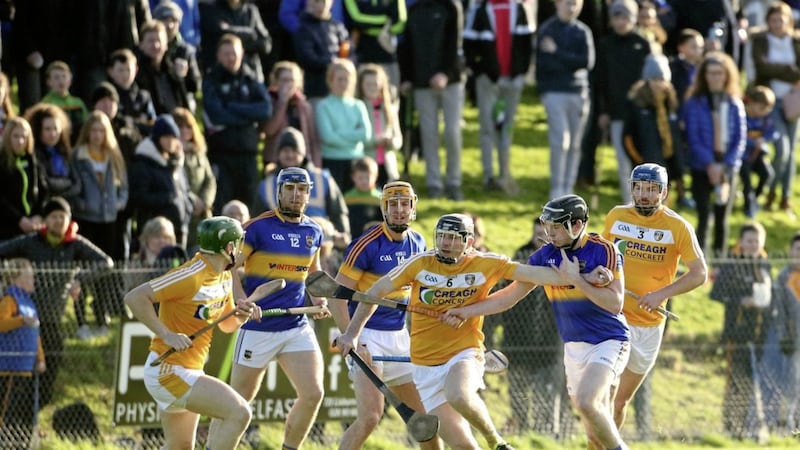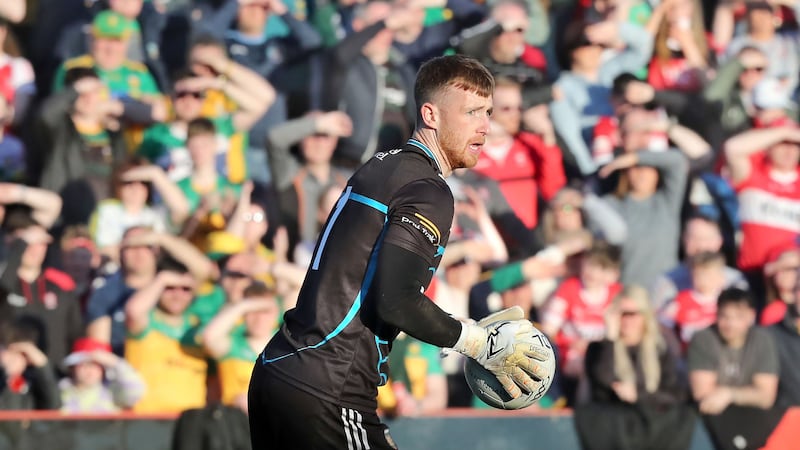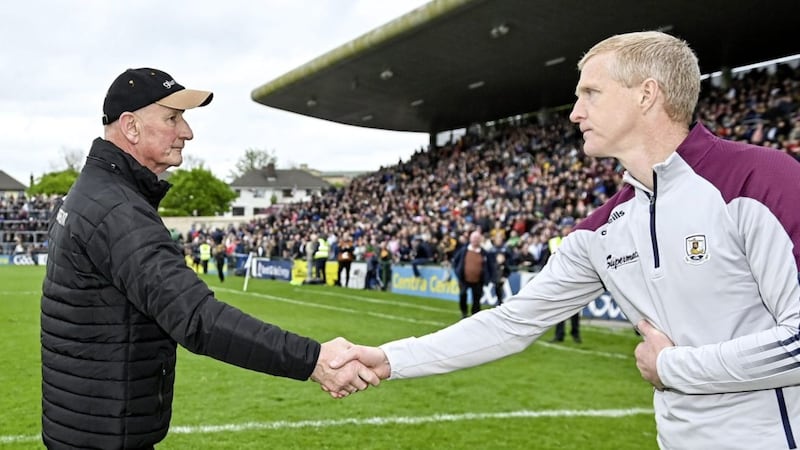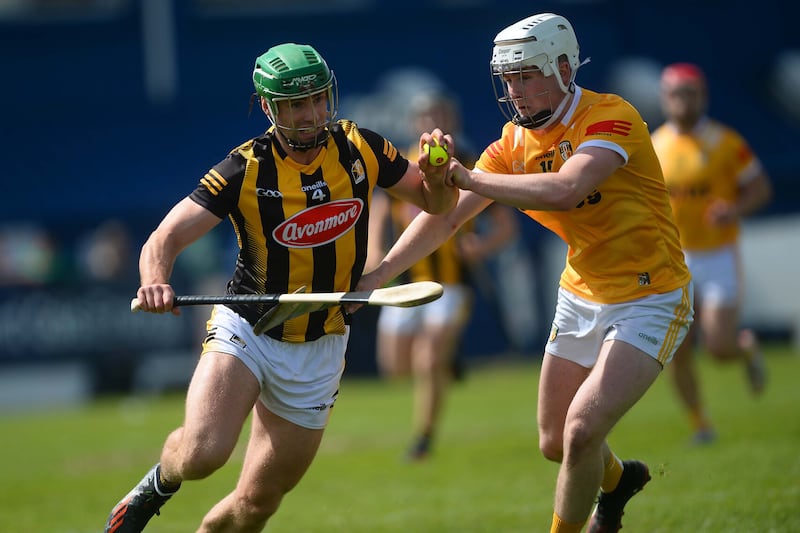‘Corrigan Park: A Place Apart’ by Denis O’Hara (Glendun Publishing, £25)
THERE’S only one thing wrong with this book - its somewhat misleading title. Even then, the author rectifies that with the opening words of his introduction:
‘This tome is a tribute in some small way to all the players, officials, and team followers who made a multitude of significant sacrifices to help raise Corrigan Park to a national level’.
Much more than a history of the Whiterock Road venue in west Belfast, it’s a history of sorts for Antrim GAA, but much more enjoyable than that too.
It’s a ‘Who’s who?’ of Saffron stars, more in the sense of ‘Who was who’, although there are plenty of interviews with still living legends.
There’s a chapter for every week of a year, but it shouldn’t take you anywhere near that long to whizz through its 336 enjoyable pages, although some readers may linger over the many wonderful old photographs. Including ‘Barnbrack’, who also played at Corrigan.
Officially opened in 1926, the ground was named after John ‘Sean’ Corrigan, a former Antrim and Ulster Secretary, from the Kashmir Road area of west Belfast, once a player with the Brian Og team.
From 1931 to 1934 there was a Corrigan Park Boxing Club, whose star was Frankie Kerr, future father of future Republic of Ireland international soccer manager Brian.
There’s another such connection, as Dessie O’Neill, dad of Northern Ireland boss Michael, recalls his hurling heyday as a goalkeeping prodigy in the Fifties – then long servant well into the Sixties - with St Gall’s, Antrim, and Ulster.
Mentions of boxing and soccer apart, mostly Corrigan was the home of Gaelic games in Antrim – football, hurling, and camogie.
Corrigan was the setting for not one but two seismic hurling shocks in 1943. Allowed back into the All-Ireland senior hurling championship, Antrim used home advantage well to edge out Galway by 7-0 to 6-2, with Danny McAllister bagging four of the Saffron scores.
A fluke? No. Leinster champs Kilkenny were then beaten by 3-3 to 1-6, which FJ McCarragher of this paper labelled ‘the greatest shock in hurling history’. Antrim were into an All-Ireland Senior Hurling Final, although Cork, Christy Ring et al, hammered them there.
O’Hara’s diligent research, from this paper’s archives and many other sources, relates much fascinating detail of lesser-known matches
It’s largely about people, though, players in particular, but with reminiscences from supporters too. Every page of print includes some interesting detail or informative anecdote.
In fact this book is jam-packed with great tales, such as how young fan Aidan O’Gorman secured the hurl of Kilkenny legend Jimmy Langton after that 1943 shock – in exchange for a bag of tea.
There’s Seamie Gallagher, one of the seven sons of Joe ‘Hack’ – you can guess why he got that nickname, and he passed his physicality on to his offspring.
Seamie, who passed away early this year, told the story of the abandoned 1955 Ulster JHC Final against Down in Kilclief, when someone came on the pitch to attack him with a post.
John Gough recalls that ‘Seamus Gallagher sent the policeman and his hat flying, and made off.’ To Ardglass, reveals the man himself: ‘I thought that was the end of it’.
Unfortunately the pitch invader turned out to be an RUC man, the local priest gave up Gallagher’s name, and he ended up in court, fined and handed a year’s probation for striking a policeman.
After Antrim moved HQ to the new Casement Park in 1953, St John’s took over Corrigan from 1956 onwards, so there is much about the ‘Johnnies’, including the Andy McCallins, of course, senior and junior.
Senior was a driving force behind Corrigan hosting the ‘Top Four’ tournament for Ulster club sides, which was the precursor of the Ulster and All-Ireland Club championships. Junior became Antrim’s first football Allstar, in the first year of that official scheme, 1971, no doubt his cause backed by the author, who was an inaugural selector.
Yet the book takes in a wide range of Antrim GAA history, starting back with nostalgic observation at the first Feis na nGleann at Waterfoot in 1904.
Understandably, Cushendun man O’Hara, a former journalist and prolific author, recalls many north Antrim icons of hurling, such as Robbie Elliott, the Donnelly dynasty of Ballycastle, Jimmy McVeigh and Pat McCarry of Carey Faughs, Dan Kinney, Terence McNaughton and Dan McKeegan of Cushendall, Frank Ward (Glenarm), Seamus and Willie Richmond, Aidan and Seamus McCamphill, Willie Devlin, Dan Gillan, Niall Wheeler, Randal McDonnell, Dan McKillop, Danny McAllister, Eugene McMullan, Colm Lynn, John Butler, Sam Mulholland, and Brendan McGarry. Among others.
The footballers of north and west Antrim who are highlighted among the 52 chapters of this hardback production - along with potted club histories - include Colm O'Loan, Patsy Totten, Liam Forde, Pat Dougan, and Tony McAtamney.
Nor does he forget the likes of Tony McAtamney's sister Mairead Magill, Mary McGarry, Peg Dooey, and the once all-conquering camogie senior teams. Included among the camog yarns is reflection on the inspired play of Rossa's Jane Adams.
From outside Antrim the book includes comment from famous players who once competed at Corrigan Park - Down legends Kevin Mussen, Paddy Doherty, and Jim Milligan, Armagh's Joe Kernan and Jimmy Smyth, Derry's Jim McKeever, Larry Diamond and Willie Cassidy, Fermanagh's Peter McGinnity, and John Joe O'Hagan of Tyrone.
In hurling there are words from Down's Charlie McMullan and Seamus McGrattan.
Of course, the spotlight centres on the big name players of Antrim's past who performed with such flair on the 1943 and 1989 teams that reached the All-Ireland senior hurling finals, and the footballers of 1946 and 1951 who won Ulster.
The names will resonate with Saffrons of a certain vintage, and those who know their history: Noel Campbell, Danny McAllister, Joe Mullan, Sam Mulholland, Kevin Armstrong, Joe McCallin, Paddy O'Hara, Harry O'Neill, Frankie Hamill, George Watterson, Dr Sean Gibson, Brian McAteer, Seamus 'Stout' McDonnell, Peter O'Hara, Malachy McMahon, Danny Dougan, Frank Fitzsimons, Andy McCallin Jnr, Aidan Hamill, Olcan McFetridge, Eddie and Dessie Donnelly.
This brilliant book is available from the author, priced £25 (P&P additional £3), at the following address:
Denis O'Hara.
2, Agolagh Heights,
Knocknacarry,
CUSHENDUN.
Co. Antrim
BT44 0QJ
Email: denisjohn39@btinternet.com
Telephone: 028217 61381








